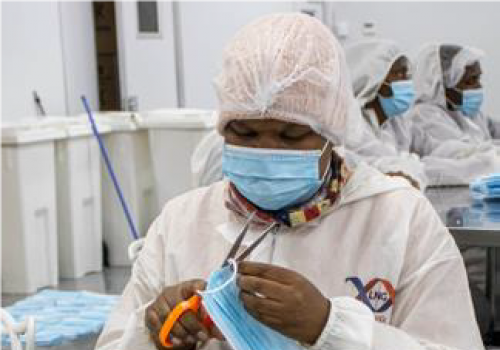The Southern African Development Community (SADC) is strengthening the COVID-19 related Pharmaceutical Products (CMPPs) value chains, given their significant potential for job creation.
Targeting the CMPPs, along with the leather and agro-processing sectors, under the Support towards Industrialisation and the Productive Sectors (SIPS) in the SADC Region, will encourage SADC Member States to address obstacles to regional integration, as well as assist the private sector to upgrade their production processes and capacity.
SIPS is a Joint Action supported by the European Union (EU) and the German Federal Government. It aims to assist the SADC industrialisation and regional integration agenda. A total amount of €20,83 million has been provided for the programme for the period 2019-2023, out of which €2,83 million is from the Federal Ministry for Economic Cooperation and Development (BMZ); and €18 million is from the EU.
The Joint Action SIPS programme has already disbursed grants to 14 companies and universities in the SADC Region to upgrade CMPPs production. The SIPS grants have been availed to companies in Botswana (1), Malawi (2), Mauritius (1), Mozambique (1), United Republic of Tanzania (3), South Africa (3) and Zimbabwe (3).
In South Africa, grants have been provided to Gabler Medical, Central University of Technology (CUT) and LNG Scientific.
Gabler was granted €99,375.44 to improve the design and increase the production of valves and ventilation devices, which are essential for the management of the acute respiratory distress syndrome, a lung condition triggered by COVID-19.
The company swiftly responded to the COVID-19 pandemic by designing a PEEP (positive end-expiratory pressure) valve and a ventilation device aimed at replacing nasal cannulas for oxygen administration.
The device administers oxygen sparingly to a patient with hypoxia, a common symptom that COVID-19 patients face. The device is cheaper and easier to use than the traditional devices produced in industrialised countries, is suited for rural settings, can function with simple oxygen cylinders, and does not need a sophisticated high-pressure oxygen infrastructure.
The SIPS grant will finance tools, equipment, and expertise to further develop the ventilation device. It will increase the weekly production capacity to 15,000 PEEP valves and 5,000 ventilation devices. Gabler anticipates that support from the Joint Action SIPS will result in the creation of 20 jobs, 75% of which will be allocated to women.
With the increased production capacity, Gabler plans to supply the local South African and the regional SADC market with locally manufactured PEEP valves and the ventilation device at a lower price and at the same quality as imported goods. The already existing export channels to South Africa, Namibia, Zimbabwe, Botswana, Mauritius, Lesotho and Eswatini will be utilised.
The Joint Action SIPS is also supporting CUT, in collaboration with the University of the Free State (UFS), with a grant of €200,000 to commercialise the design of a face respirator mask which will improve breathability, reduce filter material used in reusable face masks and improve comfort when wearing reusable respirators.
Reusable half-face respirator masks are recommended as an affordable substitute for N95/filtering facepiece level 2 (FFP2) face masks in clinical settings to reduce the demand for disposable FFP2 masks.
CUT and UFS contributed to the South African Council for Scientific and Industrial Research L.I.F.E system and developed a filter system that was part of a ventilator system. This filter system will be incorporated into their second-generation half-face respirators.
The Joint Action SIPS will support this collaborative project to enable the prototyping, clinical evaluation as well as final tooling and production of the first batch for distribution. It is anticipated that 5,000 face respirators will be produced in the first phase. CUT will be responsible for product development and commercialisation management and UFS for clinical evaluation trials aimed at design improvement.
CUT and UFS anticipate that the project will result in the creation of specialised manufacturing job opportunities.
LNG Scientific received €97,222 for the procurement of additional machinery used in the production of FFP2 cup cup-shaped respirator masks. Production of these masks is essential in mitigating the spread of COVID-19 in the labour-intensive mining and construction sectors as well as the health sector where the use of quality personal protection equipment is vital.
LNG expects to create additional 21 jobs, of which around 50% will be reserved for women, for the production of those masks. The support from the Joint Action SIPS will contribute to ensure a constant supply of affordable and high-quality masks to the South African market, SADC and other African markets.
The company holds a competitive advantage of being a local manufacturer and with this support from the Joint Action SIPS, its production capacity will increase, resulting in multiple benefits such as employment creation, reduced dependence on imports and strengthening of the production sector.

